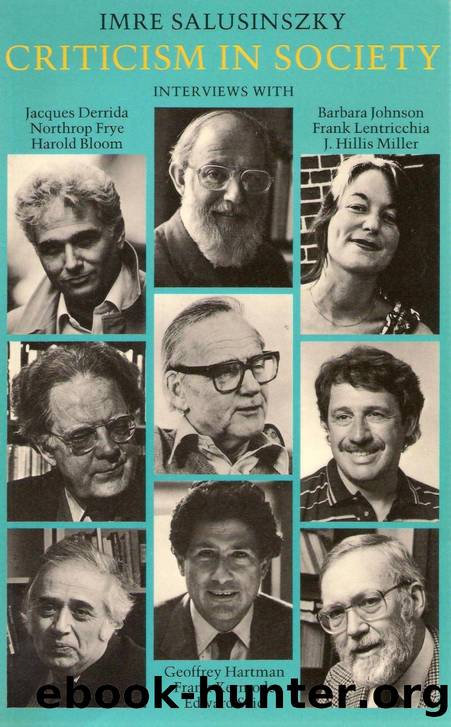Criticism in Society by Salusinszky Imre;

Author:Salusinszky, Imre;
Language: eng
Format: epub
ISBN: 1460923
Publisher: Taylor & Francis Group
Published: 2024-01-24T00:00:00+00:00
Barbara Johnson
7
Barbara Johnson
âIt seems to me that women are all trained, to some extent, to be deconstructors. Thereâs always a double message, and thereâs always a double response. The difficulty, for women, is unlearning self-repression and ambiguation and conciliation, and reaching affirmation.â
Barbara Johnson was born in Boston in 1947. She was educated at Oberlin College, in Ohio, and at Yale, where she studied with Paul de Man. She now teaches French and Comparative Literature at Harvard, where this interview was recorded at the end of February, 1986. Although not yet 40, Johnson has already established herself as one of the best-known of the second-generation deconstructors, and has been a lucid yet uncompromising mediator of deconstruction for the North American critical audience. She is the translator of Derridaâs Dissemination, but, more importantly, has in her own work applied the insights of deconstruction in ways that have made it more difficult for Anglo-American critics to ignore. This is because, in the first place, she is a resourceful reader, and her close readings have been undeniably productive in the traditional sense of generating convincing new meanings for old texts. Second, while de Man and Derrida very often deal with texts which are as difficult and foreign as the mode of analysis brought to them, Johnson has tended to take up examples which are familiar, accessible and, above all, recognizably literary. And as well as being a reliable mediator of the ideas of de Man and Derrida, she has made major contributions to deconstructive theory itself by foregrounding the question of sexual difference within the general terrain of différance.
At the beginning of her book of essays, The Critical Difference (1980), Johnson describes what is in effect a technique for reading différance. Her account is worth quoting at length:
Reading, here, proceeds by identifying and dismantling differences by means of other differences that cannot be fully identified or dismantled. The starting point is often a binary difference that is subsequently shown to be an illusion created by the workings of differences much harder to pin down. The differences between entities (prose and poetry, man and woman, literature and theory, guilt and innocence) are shown to be based on a repression of differences within entities, ways in which an entity differs from itself. But the way in which a text thus differs from itself is never simple: it has a certain rigorous, contradictory logic whose effects can, up to a certain point, be read. The âdeconstructionâ of a binary opposition is thus not an annihilation of all values and differences; it is an attempt to follow the subtle, powerful effects of differences already at work within the illusion of a binary opposition ⦠If, however, binary oppositions in this book thus play the role of the critical fall guy, it is not because one must try at all costs to go beyond them. The very impulse to âgo beyondâ is an impulse structured by a binary opposition between oneself and what one attempts to leave behind. Far
Download
This site does not store any files on its server. We only index and link to content provided by other sites. Please contact the content providers to delete copyright contents if any and email us, we'll remove relevant links or contents immediately.
4 3 2 1: A Novel by Paul Auster(11764)
The handmaid's tale by Margaret Atwood(7424)
Giovanni's Room by James Baldwin(6783)
Asking the Right Questions: A Guide to Critical Thinking by M. Neil Browne & Stuart M. Keeley(5340)
Big Magic: Creative Living Beyond Fear by Elizabeth Gilbert(5330)
Ego Is the Enemy by Ryan Holiday(4924)
On Writing A Memoir of the Craft by Stephen King(4650)
The Body: A Guide for Occupants by Bill Bryson(4562)
Ken Follett - World without end by Ken Follett(4430)
Bluets by Maggie Nelson(4245)
Adulting by Kelly Williams Brown(4215)
Eat That Frog! by Brian Tracy(4134)
Guilty Pleasures by Laurell K Hamilton(4104)
White Noise - A Novel by Don DeLillo(3819)
The Poetry of Pablo Neruda by Pablo Neruda(3804)
Fingerprints of the Gods by Graham Hancock(3723)
Alive: The Story of the Andes Survivors by Piers Paul Read(3717)
The Book of Joy by Dalai Lama(3677)
The Bookshop by Penelope Fitzgerald(3609)
